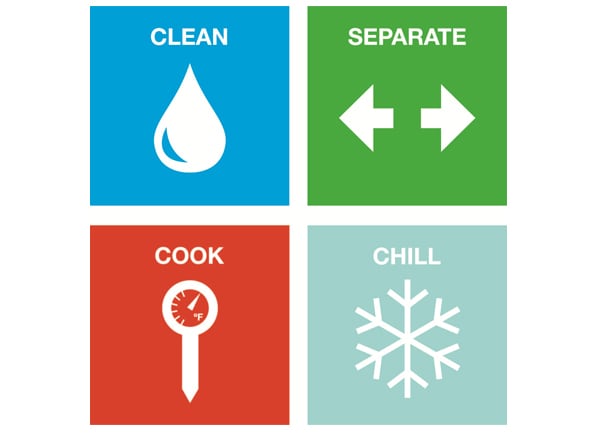Prevention
Five Fast Facts

Food Safety Steps

Remember to follow the Clean, Separate, Cook, and Chill guidelines to help keep you and your family safe from Salmonella. Be especially careful to follow the guidelines when preparing food for young children, people with weakened immune systems, and older adults.
Don’t let Salmonella make you or your loved ones sick. Take a look at these five facts and CDC’s tips for lowering your chance of getting a Salmonella infection.
- You can get a Salmonella infection from a variety of foods. Salmonella can be found in many foods, including sprouts and other vegetables, eggs, chicken, pork, fruits, and even processed foods, such as nut butters, frozen pot pies, chicken nuggets, and stuffed chicken entrees. Contaminated foods usually look and smell normal, which is why it is important to know how to prevent infection.
- Salmonella also can spread from animals to people and from people to people. Always wash your hands after contact with animals. Also wash your hands after using the toilet, changing diapers, or helping someone with diarrhea clean up after using the toilet. If you have a Salmonella infection, you should not prepare food or drinks for others until you no longer have diarrhea.
- Salmonella illness is more common in the summer. Warmer weather and unrefrigerated foods create ideal conditions for Salmonella to grow. Be sure to refrigerate or freeze perishables (foods likely to spoil or go bad quickly), prepared foods, and leftovers within 2 hours (or 1 hour if the temperature outside is 90°F or hotter).
- Salmonella illness can be serious and is more dangerous for certain people. Anyone can get a Salmonella infection, but some people are more likely to develop a serious illness, including children younger than 5, older adults, and people with immune systems weakened from a medical condition, such as diabetes, liver or kidney disease, and cancer or its treatment.
- Salmonella causes far more illnesses than you might suspect. For every person with a Salmonella illness confirmed by a laboratory test, there are about 30 more people with Salmonella illnesses that are not reported. Most people who get food poisoning do not go to a doctor or submit a sample to a laboratory, so we never learn what germ made them sick.





















.png)












No hay comentarios:
Publicar un comentario